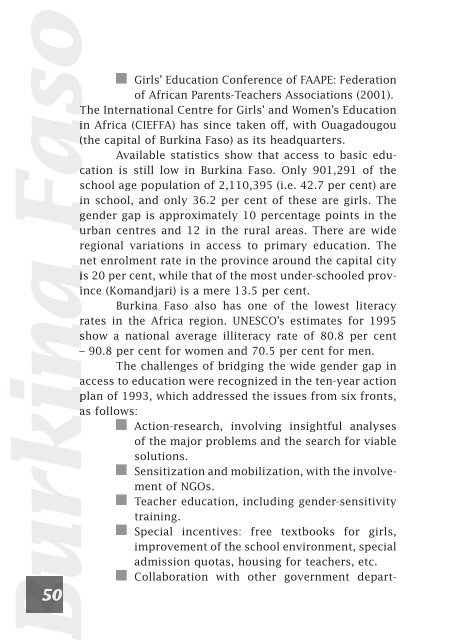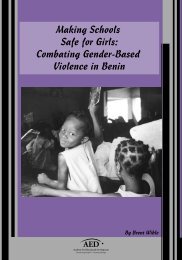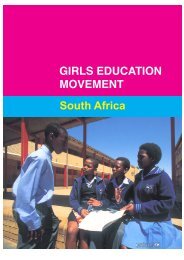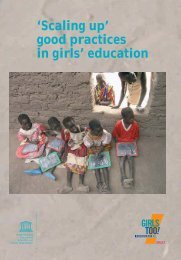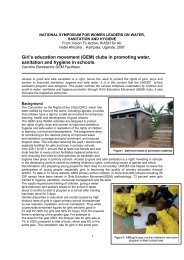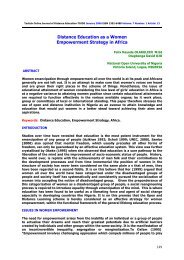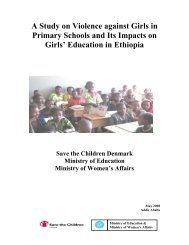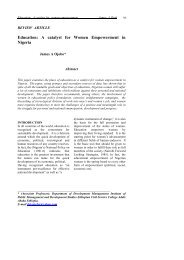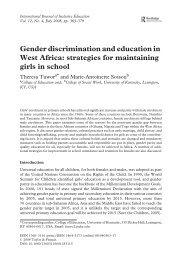Promoting basic education for women and girls ... - library.unesco-ii...
Promoting basic education for women and girls ... - library.unesco-ii...
Promoting basic education for women and girls ... - library.unesco-ii...
You also want an ePaper? Increase the reach of your titles
YUMPU automatically turns print PDFs into web optimized ePapers that Google loves.
urkina Faso<br />
50<br />
Girls’ Education Conference of FAAPE: Federation<br />
of African Parents-Teachers Associations (2001).<br />
The International Centre <strong>for</strong> Girls’ <strong>and</strong> Women’s Education<br />
sThe<br />
Africa (CIEFFA) has since taken off, with Ouagadougou<br />
capital of Burkina Faso) as its headquarters.<br />
statistics show that access to <strong>basic</strong> <strong>education</strong><br />
is still low in Burkina Faso. Only 901,291 of the<br />
ain<br />
a(the<br />
aAvailable<br />
is still low in Burkina Faso. Only 901,291 of the<br />
age population of 2,110,395 (i.e. 42.7 per cent) are<br />
school, <strong>and</strong> only 36.2 per cent of these are <strong>girls</strong>. The<br />
gap is approximately 10 percentage points in the<br />
urban Facation Fschool<br />
Fin Fgender<br />
centres <strong>and</strong> 12 in the rural areas. There are wide<br />
regional variations in access to primary <strong>education</strong>. The<br />
enrolment rate in the province around the capital city<br />
20 per cent, while that of the most under-schooled prov-<br />
(Kom<strong>and</strong>jari) is a mere 13.5 per cent.<br />
Faso also has one of the lowest literacy<br />
anet<br />
ais aince<br />
aBurkina the Africa region. UNESCO’s estimates <strong>for</strong> 1995<br />
a national average illiteracy rate of 80.8 per cent<br />
– 90.8 per cent <strong>for</strong> <strong>women</strong> <strong>and</strong> 70.5 per cent <strong>for</strong> men.<br />
challenges of bridging the wide gender gap in<br />
access nrates nshow<br />
n–<br />
nThe<br />
to <strong>education</strong> were recognized in the ten-year action<br />
of 1993, which addressed the issues from six fronts,<br />
iplan follows:<br />
Action-research, involving insightful analyses<br />
of the major problems <strong>and</strong> the search <strong>for</strong> viable<br />
solutions.<br />
kias<br />
Sensitization <strong>and</strong> mobilization, with the involvement<br />
of NGOs.<br />
Teacher <strong>education</strong>, including gender-sensitivity<br />
training.<br />
Special incentives: free textbooks <strong>for</strong> <strong>girls</strong>,<br />
improvement of the school environment, special<br />
admission quotas, housing <strong>for</strong> teachers, etc.<br />
Collaboration with other government depart-


